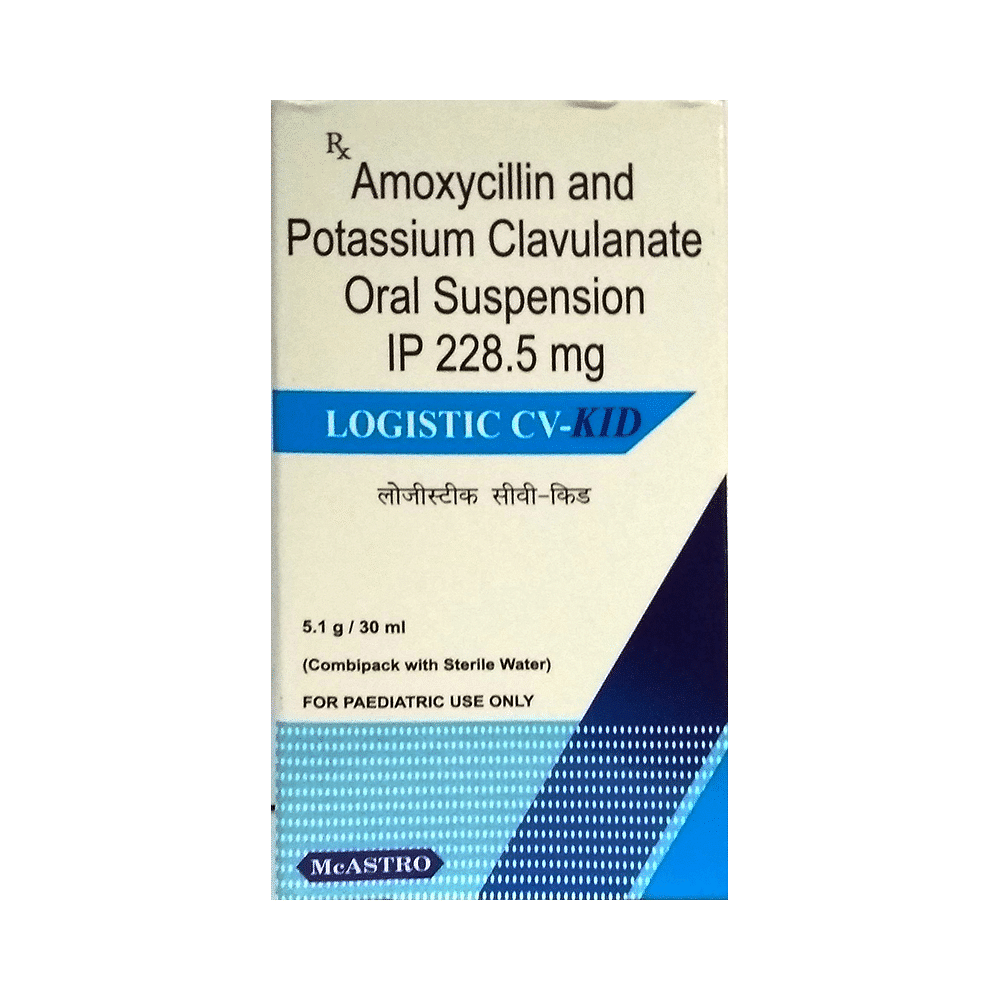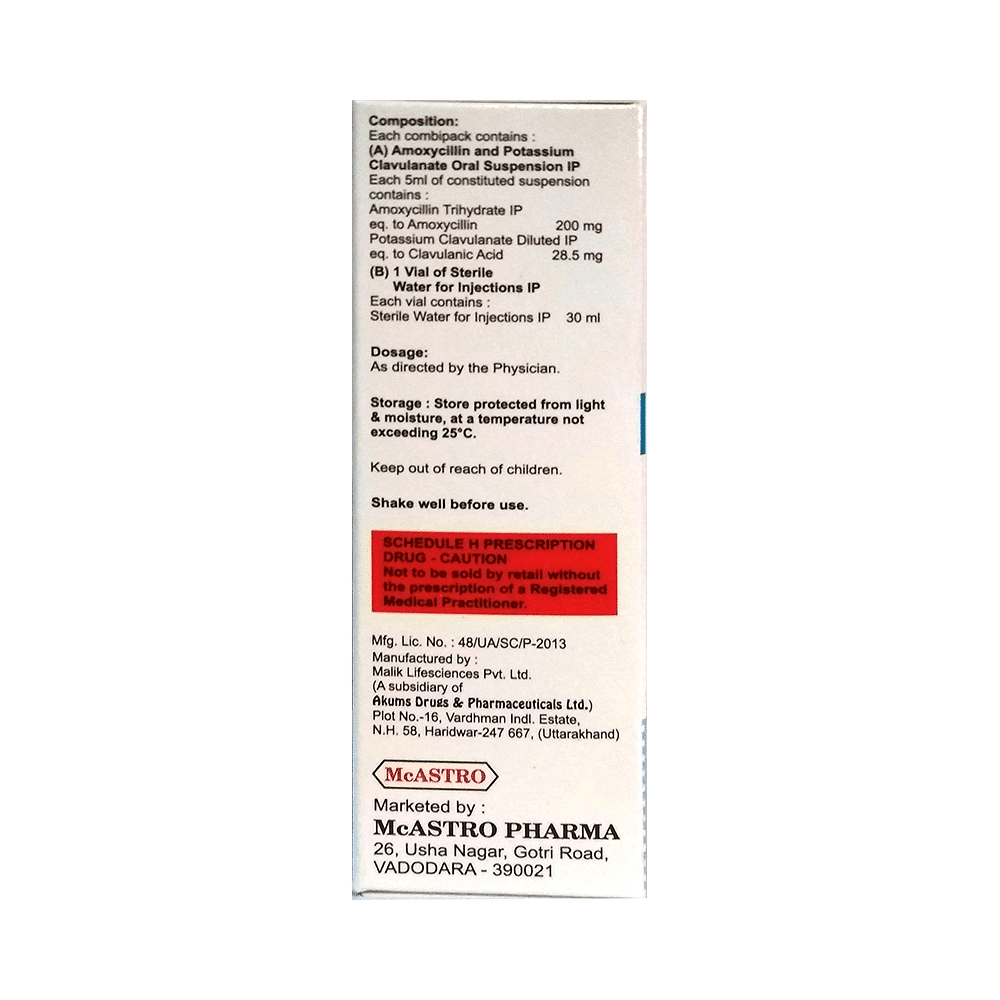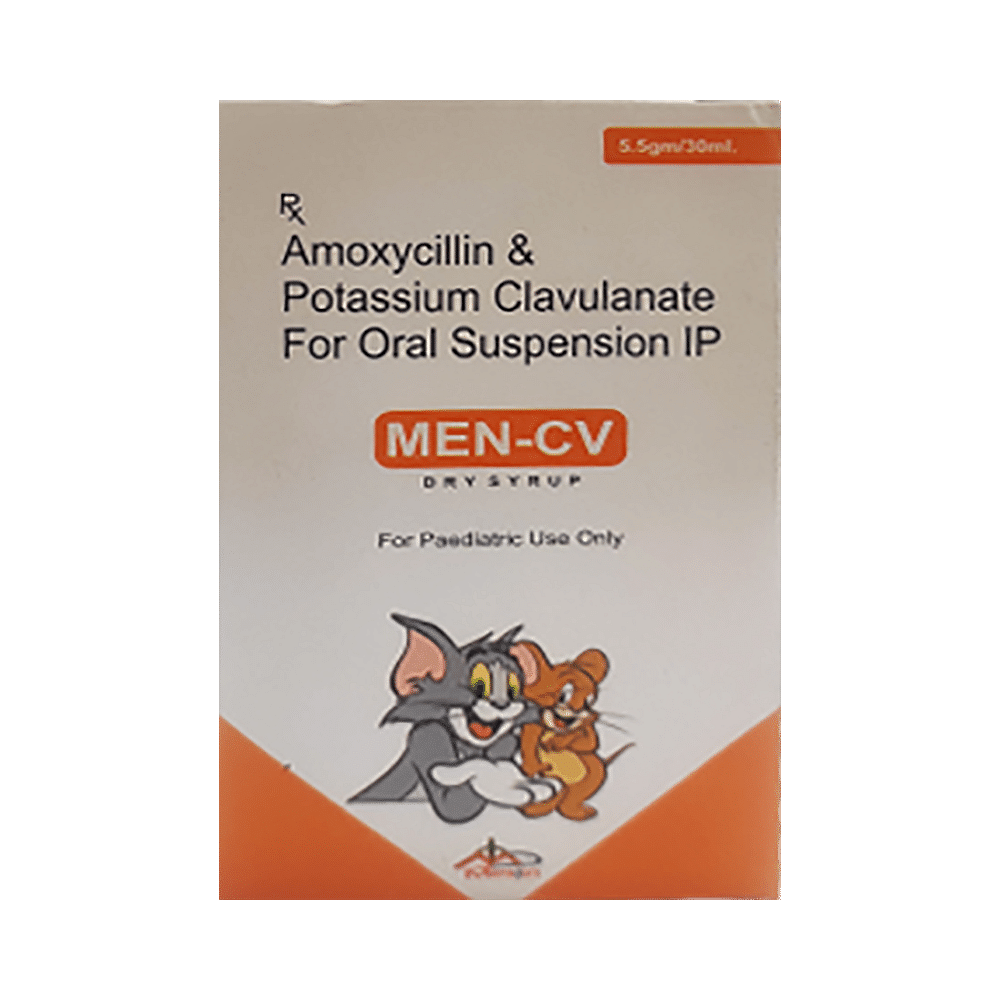

Logistic CV-Kid Oral Suspension
Manufacturer
Mcastro Pharma
Salt Composition
Amoxycillin (200mg/5ml) + Clavulanic Acid (28.5mg/5ml)
Key Information
Short Description
Logistic CV-Kid Oral Suspension is an antibiotic medicine that helps treat bacterial infections of the ear, nose, throat, chest, lungs, teeth, skin, and urinary tract.
Dosage Form
Oral Suspension
Introduction
Logistic CV-Kid Oral Suspension is an antibiotic medicine that helps treat bacterial infections of the ear, nose, throat, chest, lungs, teeth, skin, and urinary tract. It is capable of killing bacteria that have become resistant to other therapies and thus also helps treat tuberculosis that is resistant to other treatments.
Directions for Use
Your child must complete the entire course of antibiotics. Stopping too soon may cause the bacteria to multiply again or cause another infection.
How it works
Logistic CV-Kid Oral Suspension is an antibiotic. It has two active agents amoxycillin and clavulanic acid. Amoxycillin works by preventing the formation of the bacterial protective covering (cell wall) essential for the survival of the bacteria. Whereas clavulanic acid serves a special purpose of inhibiting an enzyme (beta-lactamase) that is produced by resistant bacteria. This makes the combination of amoxycillin and clavulanic acid an effective line of treatment for many types of infections.
Quick Tips
Your child must complete the entire course of antibiotics. Stopping too soon may cause the bacteria to multiply again or cause another infection. Your child may have a bitter taste in the mouth after the intake of Logistic CV-Kid Oral Suspension. Eating citrus fruit or sipping plenty of water or fruit juice may help. Encourage your child to drink plenty of water in case diarrhea develops as a side effect. Never give Logistic CV-Kid Oral Suspension until and unless prescribed by the doctor. Do not give Logistic CV-Kid Oral Suspension to treat common cold and flu-like symptoms caused by viruses. Never save medicine for future illnesses. It cannot be said whether the same medicine will work on future infections. Check ‘expiry’ before giving Logistic CV-Kid Oral Suspension to your child. Immediately discard all the expired medicines. Stop Logistic CV-Kid Oral Suspension immediately if your child develops an itchy rash, facial swelling, or breathing difficulty. Report to the doctor without any delay.
Related Medicines

Nicmox-CL Dry Syrup

Moxfit-CV Dry Syrup

Agmamed-Clav Dry Syrup

Amoxicorn-CV Dry Syrup

Moxyzust-CV Dry Syrup

Amonit Plus Dry Syrup

Men-CV Dry Syrup

Chemross 228.5mg Dry Syrup

Vimoxy-CV Dry Syrup

Tynoclav Oral Suspension
Frequently asked questions
Can other medicines be taken with Logistic CV-Kid Oral Suspension?
It is essential to inform your child's doctor about any other medicines your child is taking before starting Logistic CV-Kid Oral Suspension. Additionally, consult with your child's doctor before giving any other medicine to your child.
Can my child receive vaccinations while taking Logistic CV-Kid Oral Suspension?
Antibiotics usually do not interact with vaccine ingredients or cause adverse reactions in children who have just been vaccinated. However, it is recommended to wait until your child has recovered from the illness before receiving a vaccine.
What lab tests may my child undergo while taking Logistic CV-Kid Oral Suspension for an extended period?
Regular monitoring of kidney and liver function tests may be necessary to ensure your child's condition remains stable during prolonged therapy.
Can I give my child a higher dose of Logistic CV-Kid Oral Suspension than recommended?
No, giving a higher dose of this medicine can increase the risk of side effects. If your child's symptoms worsen, consult your doctor for re-evaluation.
Can I stop giving Logistic CV-Kid Oral Suspension to my child when their symptoms improve?
No, it is crucial to complete the full course of treatment, even if your child's symptoms improve. Stopping the medicine prematurely may lead to incomplete treatment and potential complications.
Can Logistic CV-Kid Oral Suspension cause diarrhea?
Yes, this medicine may cause diarrhea due to its antibiotic properties. If your child experiences diarrhea, ensure they drink plenty of fluids. Consult your doctor if diarrhea persists and you notice signs of dehydration, such as reduced urination with dark-colored and strong-smelling urine. Do not give your child any other medication without consulting a doctor.
Do all viral common colds result in secondary bacterial infections?
Most of the time, bacterial infections do not follow viral infections. Using antibiotics in viral infections can increase the risk of side effects. Always consult with your child's doctor before administering antibiotics.
Is yellow-green mucus in my child's nose a sign of a bacterial infection?
Yellow or green mucus in the nose does not necessarily indicate the need for antibiotics. During a common cold, it is normal for mucus to thicken and change color. Symptoms often last for 7-10 days.
Are there any signs that indicate my child needs immediate medical attention?
You should contact your child's doctor immediately if your child experiences serious allergic reactions (breathing difficulties, skin rashes), gastrointestinal infections (diarrhea), or liver damage (weakness, paleness, vomiting). Although rare, these side effects are serious and require medical attention.


